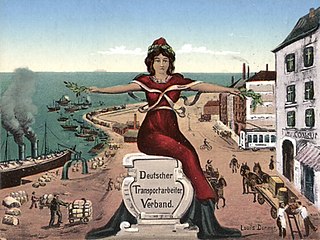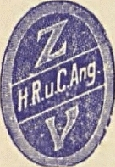Related Research Articles
The General Commission of German Trade Unions was an umbrella body for German trade unions during the German Empire, from the end of the Anti-Socialist Laws in 1890 up to 1919. In 1919, a successor organisation was named the Allgemeiner Deutscher Gewerkschaftsbund, and then in 1949, the current Deutscher Gewerkschaftsbund was formed.

The German Transport Workers' Union was a trade union representing transport workers in Germany.
The Central Union of Carpenters and Kindred Trades of Germany was a trade union representing carpenters in Germany.

The Central Union of Hotel, Restaurant and Cafe Employees was a trade union representing hospitality workers in Germany.
The Central Union of Stone Workers of Germany was a trade union representing stone masons in Germany.
Central Union of Roofers was a trade union representing roofers in Germany.

The Central Union of Shoemakers of Germany was a trade union representing people working in the shoemaking industry in Germany.

The General Union of Public Sector and Transport Workers was a trade union representing workers in various industries in Germany.
The Central Union of Bakers and Confectioners was a trade union that played a significant role in representing workers in bakeries and related trades in Germany.
The Central Union of Butchers and Kindred Trades of Germany was a trade union representing butchers and abattoir workers in Germany.
The Central Union of Glassworkers was a trade union representing people involved in manufacturing glass and glass objects in Germany.
The Union of Stone Setters, Pavers and Kindred Trades was a trade union representing paviours and people in related trades, in Germany.
The Union of German Restaurant Workers was a trade union representing workers in hotels and restaurants in Germany.

The Central Union of Employees was a trade union representing white collar, private sector workers in Germany.
Otto Urban was a German trade unionist.
The Central Union of Masons was a trade union representing bricklayers in Germany.
The Central Union of Construction Workers was a trade union representing building labourers in Germany.
The Central Union of Potters was a trade union representing pottery workers in Germany.
The Central Union of Sailors of Germany was a trade union representing sailors and related workers in the German merchant navy.
The Union of Office Employees of Germany was a trade union representing office workers in Germany.
References
- ↑ "Urban, Otto (1877-1947)". Friedrich Ebert Stiftung. Retrieved 19 June 2020.
- 1 2 Urban, Otto (1931). Zentralverband der Angestellten. ADGB. p. 2101–2106. Retrieved 19 June 2020.